Charging and Bail: Navigating the Criminal Justice System in the UK
Welcome to SQE Criminal Law & Practice Law UK, your trusted source for legal information and guidance in the UK. In this blog post, we will be discussing the process of charging and bail in the criminal justice system. Whether you’re a law student preparing for the SQE exams or an aspiring solicitor, understanding this important aspect of criminal law is essential.
What is Charging in the Criminal Justice System?
Charging is the process by which a person is formally accused of committing a crime. It is the crucial step that begins the criminal prosecution. The charging decision is made by the Crown Prosecution Service (CPS) based on the evidence gathered by the police during their investigation. The CPS evaluates the evidence to determine whether there is a realistic prospect of conviction and if it is in the public interest to proceed with the case.
Once an individual is charged, they will be notified of the specific offenses they are accused of and will usually be summoned to appear in court. It’s important to note that being charged with a crime does not imply guilt; it is merely an allegation that needs to be proven in a court of law.
The Importance of Bail in Criminal Proceedings
Bail plays a crucial role in the criminal justice system, as it determines whether an accused person should be detained or released pending trial. When a person is charged with a criminal offense, they may be remanded in custody initially. However, in many cases, the court may consider granting bail, which allows the accused to be released until their trial date.
The decision to grant bail depends on several factors, such as the severity of the offense, the likelihood of the accused absconding, and the risk of interference with witnesses or evidence. The court will carefully consider these factors to ensure public safety while respecting the principle of “innocent until proven guilty.”
If bail is granted, the accused may need to comply with certain conditions, such as surrendering passports, reporting to a police station regularly, or providing a surety (a sum of money or property) to guarantee their appearance in court. Failure to comply with bail conditions may result in the revocation of bail and the accused being remanded in custody until the trial.
Expert Legal Assistance for Navigating the Criminal Justice System in the UK
Navigating the criminal justice system can be complex and daunting, especially for those unfamiliar with its intricacies. That’s why it’s essential to seek expert legal assistance when facing criminal charges or supporting clients through the process. At SQE Criminal Law & Practice Law UK, we offer comprehensive SQE 1 and SQE 2 preparation courses, ensuring you have the knowledge and skills to excel in your legal career.
Our SQE 1 preparation courses cover a wide range of topics, including criminal law essentials, evidence, professional conduct, and legal skills. Additionally, our SQE 2 preparation courses provide practical skills training, including advocacy, case management, and legal writing.
For those preparing for the SQE exams, we also offer SQE 1 practice exam questions and SQE 1 practice mocks (FLK1 and FLK2). These resources will help you test and enhance your knowledge, enabling you to approach the exams confidently.
Stay updated with the latest SRA SQE exam dates by visiting our website. Knowing the exam dates is crucial for effective exam preparation and planning.
As a trusted authority on criminal law, we are committed to providing valuable insights and resources to help students, solicitors, and legal professionals navigate the criminal justice system in the UK. Be sure to explore our website for more informative articles and expert guidance.
Remember, understanding charging and bail is essential for anyone involved in criminal law. By familiarizing yourself with the process, you can build a strong foundation for your legal career.
Thank you for choosing SQE Criminal Law & Practice Law UK as your go-to resource for legal information. Should you have any questions or require further assistance, please don’t hesitate to contact us.
Related Articles:
